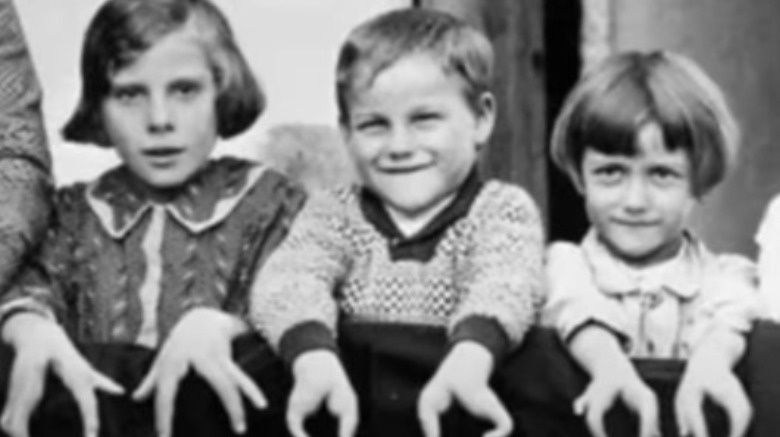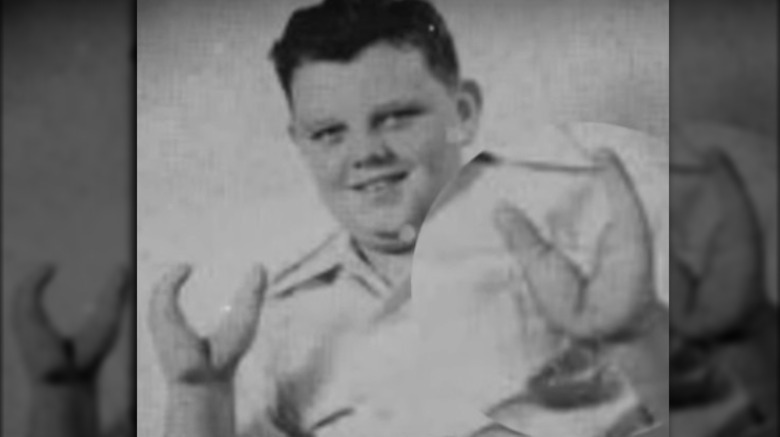Details You Didn't Know About Lobster Boy
For a period of time in the middle decades of the 20th Century, circus performer Grady Stiles was a star attraction. Known as "Lobster Boy" because of a genetic deformity in his hands and feet, Grady Stiles Jr. was among the last of his kind — deformed people who performed in traveling circuses and carnivals as "freakshow" attractions. As Healthline reported, he even inspired the character Jimmy Darling in American Horror Story: Freak Show.
Behind the scenes, however, a different kind of horror permeated the life of the man who inspired the character. The real Stiles was an abusive alcoholic who was convicted of murdering a man, and who himself died violently. He also fathered several children, at least one of whom has a complicated relationship with his father's memory, and left his indelible mark on a Florida town once famed for being a winter haven of circus and carnival performers.
Grady Stiles was from a family afflicted with ectrodactyly
Grady Stiles Jr. was born in Pittsburgh in 1937, according to All That's Interesting, to a family in which a gene that causes a congenital deformity had been present for generations. The condition is known as ectrodactyly, and it causes fingers (and in some cases, toes) to grow fused together in such a way that a person's extremities resemble the claws of a lobster.
As far back as the early 1800s, the "Lobster Family," as they were called, produced children with and without the condition. Those with it became part of the family's touring circus act, while those without it helped the family in other ways.
Grady kept up the family tradition by taking up circus life, beginning at the age of 7. Further, he was an exceptionally popular draw: for a time, the Stileses pulled in $50,000-80,000 per season — a king's ransom in those days. Like a lot of circus folks, the family would retire to Gibsonton, Florida during the slow winter season.
Grady Stiles Jr. was a violent, alcoholic murderer
Though he had a disability, it did not put Grady Stiles at a disadvantage when it came to physical prowess. Unable to walk, he sometimes used a wheelchair, though just as often he used his arms to move about, according to The Human Marvels. In the process he developed impressive upper body strength. He reportedly used that strength to smack or choke people who annoyed him, according to HuffPost, something he was reportedly exceptionally good at, considering the shape of his hands.
He also allegedly used his strength to terrify and abuse his family. For example, in one incident, it's said that he used his strength to forcibly remove his wife's IUD during a fight, according to All That's Interesting.
What's more, combined with his alcoholism and his short temper, he was a force to be reckoned with. "I think alcohol brought out the worst in him," his son, Grady Stiles III, said of his father in 2017.
Grady Stiles literally got away with murder
In 1978, as The Pittsburgh Post-Gazette would later report, Stiles' oldest daughter, Donna Stiles, had taken a shine to a man named Jack Layne, and the two had gotten engaged. Unfortunately for the young lovers, Grady didn't care for the young man.
What happened in September of that year remains in dispute, according to All That's Interesting. Either Grady invited Layne to his home to talk things over, or Grady went to Layne. Either way, the meeting ended with Layne dead, shot and killed in cold blood by Grady with his shotgun.
The performer made no attempt to put up a defense, but instead argued that he shouldn't go to prison due to his disability, as well as cirrhosis of the liver due to alcoholism and emphysema brought on by his three-pack-a-day smoking habit. A jury agreed, and instead of being sent to prison, Stiles was convicted of third degree murder and sentenced to house arrest.
Grady Stiles was also murdered
Grady Stiles died as he lived: violently.
By 1992, Stiles' family had had enough of his abusive ways. According to The Human Marvels, he would taunt his family while abusing them, referencing his light punishment for murder two decades earlier. "I killed before and got away with it, I can do it again," he would reportedly brag.
On November 29, 1992, Stiles and the family were wintering in Gibsonton when a neighbor, 19-year-old sideshow performer Chris Wyant, shot and killed the family patriarch. What happened that night is a matter of dispute. By some accounts, Wyant was hired by the family to be the hitman who would put an end to "Lobster Boy" once and for all. However, Stiles' son would later tell HuffPost that the family merely suggested to Wyant that he rough Stiles up to teach him a lesson, not to murder him.
The junior Stiles also gave his father a message during his HuffPost interview: "Thank you for showing me who not to be and maybe you can appreciate who I became because of that. You were a drunken bastard but you were my dad," he said.
Stiles' fellow circus performers spoke ill of him for decades after his death
For a time, the Tampa Bay-area town of Gibsonton, Florida had a reputation for being a haven for so-called "freaks," the town in which circus performers would find comfort in their own seasonal community while taking the winter months off. However, Gibsonton wanted naught to do with "Lobster Boy" after his death. So hated was the former performer that no one wanted to be his pallbearer at his funeral, as HuffPost reported.
Writing for Sideshow World in 2006, Chris Rodell told of travelling to Gibstonton to look for the remaining "freaks" and to talk about the town's most famous resident, only to find closed lips when he mentioned the name. "We don't even like to talk about that ... It was all so terrible," townsperson Judy Rock told him.
These days, Gibsonton is a shell of what it had once been. As townsperson Ken Hayward told Rodell, the social welfare system these days means that "freaks" can collect a disability check, rather than having to seek out a living in the sideshow circuit. "There are no freaks in carnivals anymore. The government put 'em all out of business," he said.





